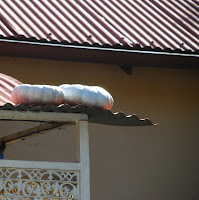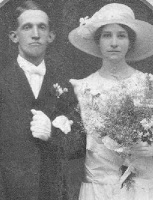I am only now realising that my brain is like a computer. I have things stored away that pop up on occasions such as this. Listening to the Afrikaans song “Pampoene op die Dak” has set the ball rolling again. “Pampoene Op Die Dak” means Pumpkins On The Roof.
My dad used to grow pumpkins between the rows of mealies, and at the end of the season the land would be dotted with big white ‘Boerpampoene’. They were the very best eating pumpkins in the whole world, flat and white. If you turn them over you can see a ring where the flower used to be, and the bigger the ring the nicer the pumpkin. To this day, when buying a ‘Boer’ pumpkin, I choose the one with the biggest ring. A span of oxen pulling a wagon would be sent into the land to pick up the ripe fruit. The best fruit would be laid out on a flat roof; the best place to keep them from rotting. The servants would be given a share, and the small and rejected ones would be piled next to the pig sty for their winter food. You may see pumpkins stored on a roof in winter even these days as we did a few years ago when visiting “Evita Se Perron” in Darling on the West Coast. (See photo taken at Darling)
Other melons which grew amongst the Mealies were ‘karkoere’ and ‘makatans’. Karkoere were small round melons and very bitter to the taste and were used as pig food. They grew in the hundreds and were actually weeds. Those which stayed behind on the lands were eaten by the cattle and sheep, or they rotted there for their seed to grow again the next year. The Makatan, also known as a Kaffir Melon, was big and round, and when cut open was the colour of butter. The town folk always bought them from the farmer and they were used for making Melon and Ginger Jam, or those very sweet pieces of ‘Konfyt’. Some farmers also grew calabash gourds of different sizes which could be cooked and eaten while still young and green, or allowed to dry. (The Basutos called them marankies). . When ripe and dry the small ones were used for ornamental purposes and the big ones were opened at the top to use for storing water or sour milk which was known in Afrikaans as ‘Kalbas Melk’. These days it is sold in our Supermarkets as ‘Maas ”.
A Mushroom for the gods.
Many types of mushroom grow in South Africa














